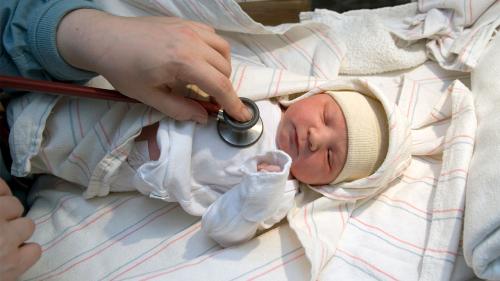Heard About New-born Screening? Tests Babies Go Through After-birth

Since most babies’ development is safe and healthy in the mother’s womb for nine months, after birth they are also considered to be healthy. However, some babies are found to be born with some rare but serious kind of sickness or health condition. And these disorders are mostly inherited or metabolic, which if left undetected and untreated turn out to be life-threatening.
Fortunately, medical science has advanced to a level that the doctors monitor the babies’ health after birth through several screenings or tests.
Now, what are these tests that will be able to determine the health conditions in babies at an early stage?
Read on to find out:
New-born Screening Tests
For Hypothyroidism
1 in 1700 babies are affected.
Thyroid hormone in babies is important for their physical growth and brain development. Hypothyroidism, however, refers to an underactive thyroid gland, which if left untreated, may result in mental disabilities and growth failure. But, with early detection (at least within the first four weeks of the babies’ life) and medical intervention, they are likely to lead a healthy and normal life.
For Endocrine Disorder
1 in 2,570 newborns are affected.
The endocrine system produces hormones, which act as a chemical messenger to control the growth, development, metabolism, and reproduction in a body. In fact, for a child’s transition from infancy to adulthood, the endocrine system has to function properly. But, either due to the deficiency or excess of production of these hormones, an infant’s bodily growth may be compromised. Not just that, there might be severe salt loss in the body and dehydration, making the baby feel imbalanced. Unfortunately, such a condition can be life-threatening for babies. Detection and treatment within 7 to 14 days of a baby’s life, might prove to be a savior.
For Galactosemia
1 in 10, 350 newborns may be affected.
Galactosemia basically means “galactose in blood”3. To put it in simple words, the presence of sugar in milk (breast milk, cow milk and other milk products). Babies in this condition are unable to metabolize galactose, from the mother’s milk, which eventually can’t be broken down, to build the infant's immune system. As a result, babies appear yellow in their skin and the eyes, lethargic, irritable, and so on and so forth. In fact, an increased level of galactose leaves the liver, brain, kidneys, and eyes of a baby damaged. Detection of the disorder within weeks of a baby’s birth can bring it under control.
Cystic Fibrosis
is an inherited genetic disease. It results in breathing problems, lung infections, and damage to the lungs of the babies. Basically, the faulty genes prevent the salt in the body to move freely in and out of the cells of the body. Simultaneously, digestive juices in the babies also become thick. And without sufficient nutrition in the body, a baby’s physical development can get compromised. Plus, improper digestion and bowel movements may lead to diabetes. Detection of the symptoms within the first few days of baby’s birth may prevent the child from serious turn outs of the problem and keeps the baby as healthy as possible.
Sickle Cell Anemia
Is an inherited blood disorder in babies. A healthy baby will have red blood cells of the round, donut shape. But a baby suffering from sickle cell anemia will have red blood cells which will be crescent or sickle-shaped. In fact, red blood cells shaped abnormally can block the flow of the blood to certain parts of a baby’s body. If left untreated, this condition can make the child life-threateningly anemic and damage some of the major organs of the baby6, thus making them appear pale and tired. Detection of the symptoms at birth or by 4 months of birth, may surely prevent the child from causing further damage. Moreover, medicines, vaccines, blood transfusions are certainly some of the ways to treat the problem the moment it is found, however, cord blood stem cell banking benefits this disorder.
Hearing Screening
Hearing plays a vital role in a child's life, thus enhancing the other developmental skills in babies. In fact, hospitals ensure that the newborns leave the hospital after they get the hearing test done. Early detection can bring a change in the baby’s life.
To Conclude
Usually, the screening is done within 24 to 48 hours of a baby's birth. Most of them get a clean chit, however, if a baby is screened positive, taking the doctor’s advice becomes a necessity.
Post Your Ad Here
Comments